|
|
|
Sort Order |
|
|
|
Items / Page
|
|
|
|
|
|
|
| Srl | Item |
| 1 |
ID:
152958


|
|
|
|
|
| Summary/Abstract |
This issue of Small Wars and Insurgencies focuses on the continuing importance of Maoist and post-Maoist concepts of people’s war. It has assembled a collection of papers that addresses various examples from around the world, with an emphasis on South America, where the premier illustration, that of Colombia’s FARC, was Marxist-Leninist but not Maoist, yet embraced the form and strategy of people’s war in a bid which at one point had the state in a critical situation. The collection comes in the wake of previous papers published in this journal on politically Maoist insurgent movements in South Asia, notably Mika Kerttuenen’s study of Maoist insurgents in Nepal and Prem Mahadevan’s survey of Maoist insurgencies in India and their links to organized crime (Kerttunen, “A Transformed Insurgency,” 78–118; Mahadevan, “The Maoist Insurgency in India,” 203–20). The papers confirm that people’s war remains an important analytical framework in the study of small wars and insurgencies, for some even a ‘model’ through which to understand distinct types of insurgent movements and their strategies.
|
|
|
|
|
|
|
|
|
|
|
|
|
|
|
|
| 2 |
ID:
152967
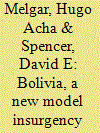

|
|
|
|
|
| Summary/Abstract |
In Bolivia, a brilliantly executed insurgency was carried out between 1995 and 2005, so much so that few perceived it as such. Its most important characteristic was its correct evaluation of the relative correlation of forces and application of the right combination of all forms of struggle. This was possible because of its pragmatism. Though not bound by ideological dogmatism, it nonetheless displayed a deep understanding of insurgency and revolutionary theory. This allowed adaptation and evolution in a changing context. The main form of struggle was not military violence, although it was not absent, but rather violent social protest funded by drug trafficking proceeds. The strategy thus neutralized traditional counterinsurgency models, because it made it difficult to apply coercive force as the enemy was not clearly identifiable. Its success in Bolivia means that the emergence of a new model of insurgency, one still built upon the popular mobilization of people’s war but more attuned to new global realities, is a reality.
|
|
|
|
|
|
|
|
|
|
|
|
|
|
|
|
| 3 |
ID:
152964
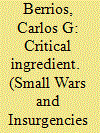

|
|
|
|
|
| Summary/Abstract |
In assisting states facing insurgencies, few subjects are more vital than understanding the manner in which external aid can be applied in a sustainable manner. Colombia, touted by proponents as a case study for astute application of external reinforcement for democracy, is just as often held up by critics as an illustration of the misplaced priorities of the US. No part of the critique is more prevalent than assertions concerning the nature of US military assistance. American aid to counterinsurgency filled particular capacity gaps and enhanced capabilities that already existed. These were possible due to the Colombian ability to absorb input.
|
|
|
|
|
|
|
|
|
|
|
|
|
|
|
|
| 4 |
ID:
152963


|
|
|
| 5 |
ID:
152965


|
|
|
|
|
| Summary/Abstract |
In the recent era of state formation in Afghanistan, hundreds of small popular movements rebelled against the Taliban throughout the country. One in particular stands out – the Andar Uprising in the spring of 2012 gave a compelling case of local vigilantism in an area ripe with historic grievances and narratives of community defense dating back to the anti-Soviet jihad. This case is compelling as it shows one faction of the movement engaging in protective paramilitary behavior over the civilian population, while the other faction engages in predatory behavior. Controlling processes, incentives structures, and narratives were all factors correlating to the rise of a popular anti-Taliban resistance in Andar District that battled the Taliban and perceived oppression in their district. When patrons and the community engaged in complementary governance over the paramilitary group, in this case through the Afghan Local Police (ALP), paramilitary behavior was protective of the civilian population. However, when patrons and communities failed to provide complementary governance, as the case of the remaining Uprising force after ALP institutionalization, the paramilitaries engaged in predation on the local population.
|
|
|
|
|
|
|
|
|
|
|
|
|
|
|
|
| 6 |
ID:
152961
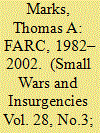

|
|
|
|
|
| Summary/Abstract |
Recent controversy during the conclusion of peace talks has renewed discussion as to the nature of the effort by Fuerzas Armadas Revolucionarias de Colombia, or FARC (Revolutionary Armed Forces of Colombia), to seize state power. FARC presents itself as an insurgency produced by societal imperfections and purports to speak for the marginalized and alienated of Colombia. Critics contend that FARC is a ruthless narcoterrorist organization that has targeted the people. In fact, FARC comes closer to the latter than the former, because its critical decision to privilege criminality for generation of means destroyed execution of a viable people’s war strategy. Ultimately, means devoured ways in such manner as to make ends unachievable. Criminality, though it made FARC perhaps the richest insurgent group in the world during its heyday, laid the foundation for its defeat by ceding legitimacy, and thus mass mobilization, to the democratic state.
|
|
|
|
|
|
|
|
|
|
|
|
|
|
|
|
| 7 |
ID:
152966
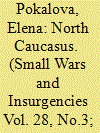

|
|
|
|
|
| Summary/Abstract |
Insurgencies have proven to be highly adaptive movements that exploit their environments and change and mutate in order to survive. States and international actors have long grappled with ways to thwart such adaptations. In this respect, disengagement initiatives that offer insurgents opportunities for alternative livelihood seem to present a viable mechanism for weakening insurgencies. Analyzing the case of the North Caucasus insurgency, this article examines the interrelation between such variables as insurgent crises, government disengagement programs, and foreign attempts to co-opt the insurgency. It is argued that disengagement programs implemented during the second Chechen conflict prevented the insurgent command from pledging allegiance to Al-Qaeda because insurgents had to preserve their local orientation to compete for their bases of support. In 2014, however, the North Caucasus insurgents pledged allegiance to the Islamic State of Iraq and Syria as no viable disengagement opportunities existed at the time and their only route for survival was to join a global insurgency.
|
|
|
|
|
|
|
|
|
|
|
|
|
|
|
|
| 8 |
ID:
152960
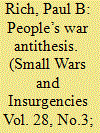

|
|
|
|
|
| Summary/Abstract |
This paper re-evaluates the role and significance of Che Guevara and focismo in the strategic debate on insurgent warfare. It argues that Guevara’s approach to making revolution in Latin America and the Third World emerged out of his own earlier escapades as a restless tourist travelling through South and Central America in the early 1950s. Guevara’s life was one marked by a struggle to define an identity in a continent that he saw as dominated by the informal imperial power of the US. Focismo crystallised in the years after the Cuban Revolution in 1959 into an ideological concept supportive of the Castro regime’s claims to provide a distinctive new model of Third World revolution in opposition to those of the Soviet Union and China. Focismo has survived in the contemporary era as an approach that partly describes some modern terrorist and Jihadist movements in the Middle East.
|
|
|
|
|
|
|
|
|
|
|
|
|
|
|
|
| 9 |
ID:
152959
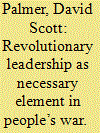

|
|
|
|
|
| Summary/Abstract |
Though it is well understood that all internal upheaval within a polity is a consequence of agency interacting with structure, the importance of the former has perhaps become too pushed to the rear. In reality, as demonstrated by the case of Sendero Luminoso (Shining Path) in Peru, even cases which seem most determined by structural factors, in practice remain problematic, absent necessary revolutionary leadership. This leadership in turn, can make mistakes just as it guides successes.
|
|
|
|
|
|
|
|
|
|
|
|
|
|
|
|
| 10 |
ID:
152962
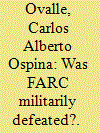

|
|
|
|
|
| Summary/Abstract |
The concept of military victory has become opaque and quite different from the days of the industrial wars. Full military victory through total annihilation of the enemy has yielded to more complex ways of achieving political objectives. Eventually the understanding of the fact that the war is unwinnable on martial terms shifts insurgent strategy to one of survival, normally peace talks. It is this very shift of strategy, albeit the absence of insurgent annihilation, that constitutes the core of military victory for the government. Politicians and decision makers, if not military forces, blinded by the victory idea of the past, are unable to understand this reality. Hence, when peace talks are held, they are approached as the end of conflict rather than a shift to war by other means. This gives the upper hand to the insurgents.
|
|
|
|
|
|
|
|
|
|
|
|
|
|
|
|
|
|
|
|
|